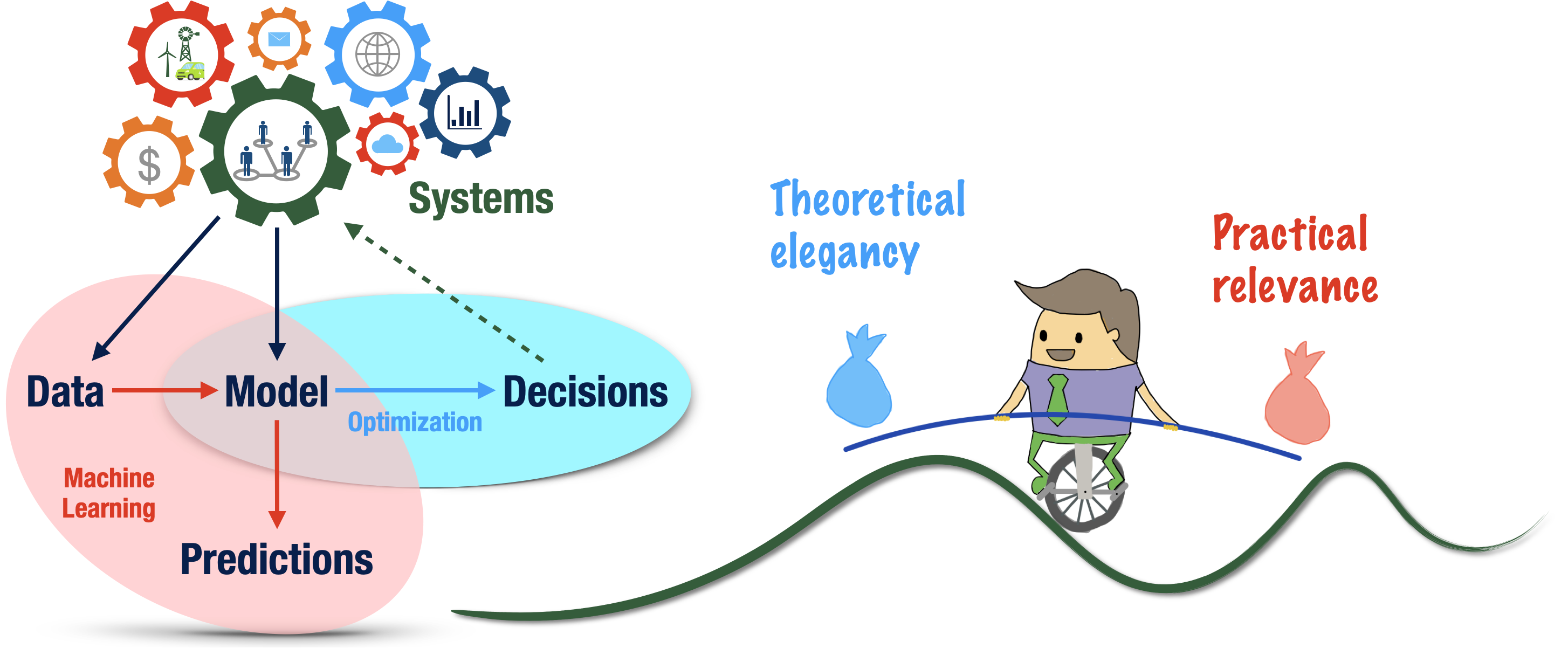

We are the System-driven Optimization & Decision Algorithms Lab (SODALab) based in the Department of Computing Science at the University of Alberta (UofA) and the Alberta Machine Intelligence Institute (Amii) in Edmonton, Canada. Our research aims to understand how to navigate different forms of uncertainty in algorithmic decision making, drawing on tools and insights from computer science, economics, statistics, and operations research.
At the SODALab, we view much of the modern world as systems of interacting, often self-interested, strategic agents who share and compete for limited resources amid various forms of dynamics and uncertainty. This perspective is particularly relevant to large-scale systems and platforms that significantly impact environmental, social, and economic sustainability, such as electrical grids, data centers, and the Internet. In these systems, complex interactions among multiple stakeholders are pervasive, and ensuring robustness and resilience against intricate dynamics or unforeseen disruptions is essential. Moreover, public tolerance for outcomes that are opaque, unfair, or risky is generally low — if not outright intolerable. These challenges motivate our long-term research vision: to develop a systematic framework for decision-making under uncertainty, with provable yet balanced guarantees across key metrics such as efficiency, robustness, fairness, and risk.
Latest News
Jan 2026: [Student Milestones]
Siyuansuccessfully passed his thesis defense. Congratulations!!
Siyuan’s MSc thesis: “Online Fractional Knapsack with Packing Costs and Group Quotas.”Jan 2026: [Paper Acceptance] Our paper, “Online Rounding and Pricing Schemes for $ k $-Rental Problems,” accepted to
WWW 2026.Nov 2025: [Paper Acceptance] Our paper, Ordinal Secretaries with Advice, accepted to
AAAI 2026.Sep 2025: [Paper Acceptance] Two papers accepted to
NeurIPS 2025.
Our first paper, “Computational Hardness of Reinforcement Learning with Partial $q^{\pi}$-Realizability,” investigates the computational complexity of reinforcement learning with a generative model under partial $q^\pi$-realizability—a setting where only a subset of policies admit linear realizability. This is in contrast to the conventional $q^\pi$-realizability assumption, under which the action-value functions of all policies are linearly realizable.
The second paper, “Online Multi-Class Selection with Group Fairness Guarantee,” studies an online allocation problem with group fairness guarantees. It addresses two key questions left open by our prior work in
ACM SIGMETRICS 2025: (i) how to handle the case where agents may belong to multiple groups, and (ii) how to ensure group fairness in online allocation when resources are indivisible.Sep 2025: [Member Highlights]
Lyndonjoined the lab as a MSc student. Welcome!!Jul 2025: [Service Updates]
Xiaoqito serve on the program committees ofACM SIGMETRICS 2026,WINE 2025, andACM e-Energy 2026.May 2025: [Member Highlights]
Vladreceived the Canada Graduate Scholarships – Doctoral (CGS D) Award. Congratulations!!Apr 2025: [Paper Acceptance] Our paper, “Cap-and-Penalize: Competitive Mechanisms for Multi-Phase Regularized Online Allocation,” accepted to
IJCAI 2025.
Apr 2025: [Student Milestones] Four MSc students successfully defended their theses. Congratulations!!
Hasti’s MSc thesis: “Value-oblivious Secretaries with Advice.”Kimia’s MSc thesis: “Multi-phase Regularized Online Allocation.”Shayan’s MSc thesis: “Computational Complexity of Reinforcement Learning under Partial $ q^{\pi}$-realizability.”Hossein’s MSc thesis: “Randomized Posted Pricing and Rounding Schemes for Online Selection and Matching.”Mar 2025: [Paper Acceptance] Our paper, “Online Allocation with Multi-Class Arrivals: Group Fairness vs Individual Welfare,” accepted to
ACM SIGMETRICS 2025.Feb 2025: [Paper Acceptance] Our paper, “Threshold Policies with Tight Guarantees for Online Selection with Convex Costs,” accepted to
ACM Transactions on Economics and Computation. An earlier version of this paper was presented inWINE 2023.Feb 2025: [Paper Acceptance] Our paper, “Posted Price Mechanisms for Online Allocation with Diseconomies of Scale,” accepted to
WWW 2025.Jan 2025: [Student Milestones]
Yanzhaosuccessfully passed his thesis defense. Congratulations!!
Yanzhao’s MSc thesis: “Online Conversion under Horizon Uncertainty: From Competitive Analysis to Learning-Augmented Algorithms.” The thesis is partially based on the paper: “Knowing When to Stop Matters: A Unified Framework for Online Conversion under Horizon Uncertainty.”Jan 2025: [Member Highlights]
HaoxinandFarazjoined the lab as PhD students. Welcome!!
Acknowledgement: We are grateful for the generous support from the following sponsors.